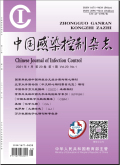中国感染控制杂志2024,Vol.23Issue(8):993-1000,8.DOI:10.12138/j.issn.1671-9638.20245335
基于医院感染预警系统的江西省某三甲医院就诊患者HCV微消除模式探索及评价
HCV micro-elimination mode for patients in a tertiary first-class hospital in Jiangxi Province based on healthcare-associated infection early warning system
摘要
Abstract
Objective To explore and evaluate the micro-elimination mode of hepatitis C virus(HCV)in patients in a general hospital in Jiangxi Province,and provide reference for formulating provincial strategies to eliminate the public health hazards of HCV.Methods Relevant data of hospitalized patients who received HCV screening at the hospital from January 2021 to December 2022 were collected.Data from 2021 were set as the baseline and data from 2022 as the HCV micro-elimination mode operating data.Indexes such as gender,age,department,anti-HCV posi-tive rate,HCV-RNA positive rate,etc.were analyzed.The operational effect was analyzed based on specialty de-partment visiting rate,treatment rate,and loss-to-follow-up(LTFU)rate.The development of the mode was quan-titatively evaluated by superiority weakness opportunity threats-analytic hierarchy process(SWOT-AHP)method.Results A total of 397 744 hospitalized patients underwent anti-HCV screening from 2021 to 2022,with a male to female ratio of 1.34∶1 and an average age of 54 years old.The main departments for patients receiving screening were infectious diseases/gastroenterology departments.HCV gene subtypes in specimens from 62 patients was mainly subtype 1b(43 specimens),followed by subtype 6(9 specimens).The first HCV early warning rate after mode operation was 81.20%,the anti-HCV detection rate after warning was 93.15%,and the anti-HCV detection rate after subsequent pop-up window early warning was 100%.Compared with 2021,the treatment rate of HCV hospi-talized patients in 2022 has increased,with statistically significant difference(P<0.05).However,there were no statistically significant differences in patients'specialty department visiting rate and LTFU rate(both P>0.05).Barycentric coordinates calculation P(X,Y)=(0.018 2,0.006 9)located in the first quadrant.Conclusion The HCV micro-elimination mode for patients in a general hospital in Jiangxi Province is feasible and effective.Further mode optimization should focus on strengths/opportunities(SO)strategy,to rely on internal advantages and utilize external opportunities.关键词
丙型肝炎病毒/微消除/医院感染系统/预警系统/模式探索/HCVKey words
hepatitis C virus/micro-elimination/healthcare-associated infection system/early warning system/mode exploration/HCV分类
医药卫生引用本文复制引用
徐祎琳,涂嘉欣,曾凌,章吉威,康怡,刘菁,刘珉玉..基于医院感染预警系统的江西省某三甲医院就诊患者HCV微消除模式探索及评价[J].中国感染控制杂志,2024,23(8):993-1000,8.基金项目
江西省自然科学基金项目(20232BAB216039) (20232BAB216039)

